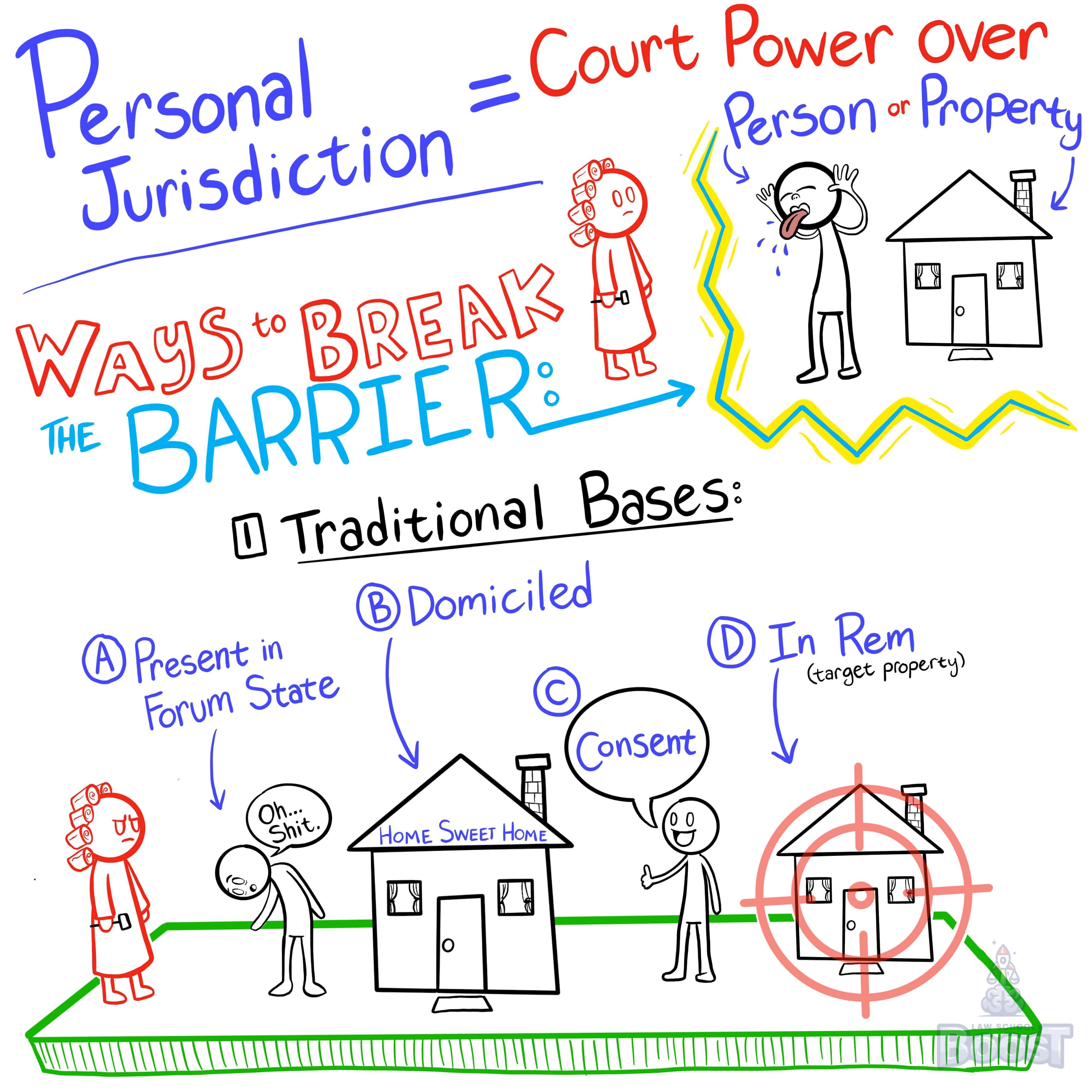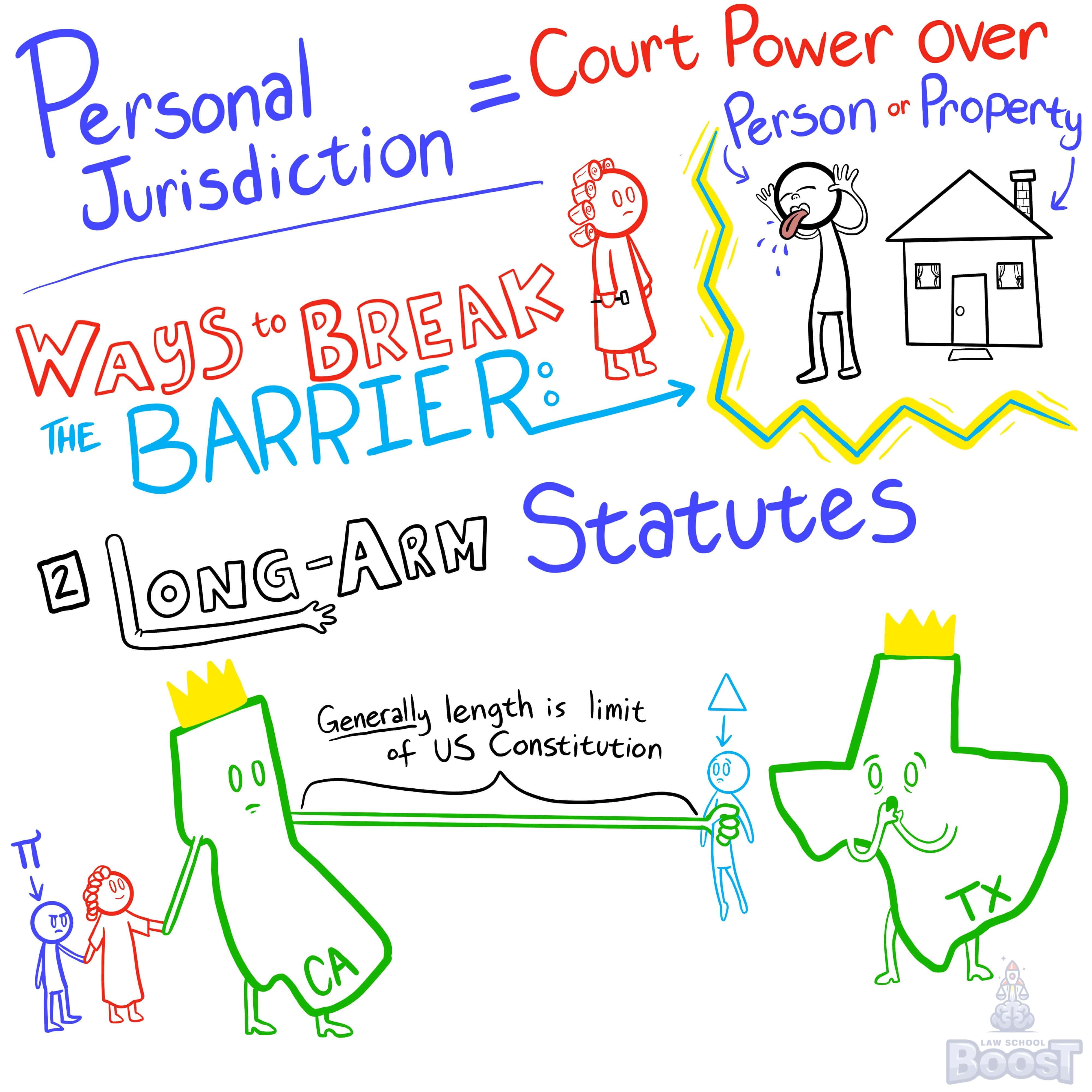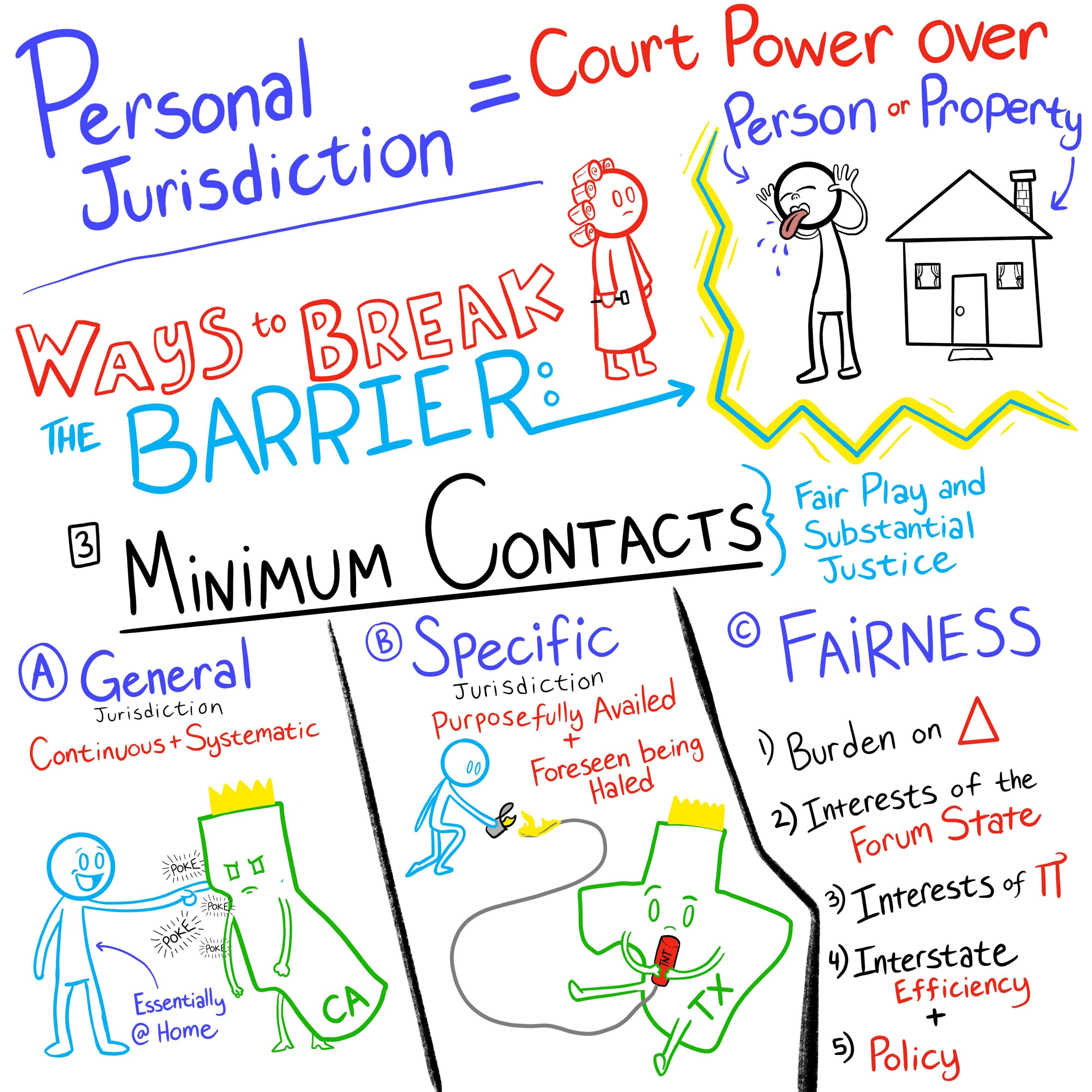🤤
Civil Procedure • Personal Jurisdiction
CIVPRO#007
Legal Definition
A court can exercise specific jurisdiction over a defendant if: (1) the defendant purposefully availed themselves of the privileges and benefits of the forum state; (2) the defendant knew or should have reasonably anticipated that their activities in the forum state made it foreseeable that they could be haled into court there; and (3) the claim arose out of those minimum contacts.
Plain English Explanation
There are two ways for a court to exercise personal jurisdiction over a defendant. The first is general jurisdiction and the second is specific jurisdiction.
General Jurisdiction over a defendant occurs when a defendant has arguably (and you will have to argue this on an exam) consented to the jurisdiction by interacting so commonly with the forum state that they are, for all practical reasons, essentially a resident of the state like any other resident.
Specific Jurisdiction, on the other hand, can be exercised when the claim against the defendant has to do with their action within the state. In this way, the court has specific jurisdiction in a specific instance/case.
In other words, a state will always have personal jurisdiction over its residents, but only sometimes has jurisdiction over non-residents. Instances where they have such jurisdiction over non-residents are either (a) when the non-resident is practically and arguably a resident based on how frequently they engage with the State, or (b) when the non-resident defendant is being sued for something they can be connected to in some way, like tipping a line of dominoes outside of the state that eventually reach a resident within the state.
General Jurisdiction over a defendant occurs when a defendant has arguably (and you will have to argue this on an exam) consented to the jurisdiction by interacting so commonly with the forum state that they are, for all practical reasons, essentially a resident of the state like any other resident.
Specific Jurisdiction, on the other hand, can be exercised when the claim against the defendant has to do with their action within the state. In this way, the court has specific jurisdiction in a specific instance/case.
In other words, a state will always have personal jurisdiction over its residents, but only sometimes has jurisdiction over non-residents. Instances where they have such jurisdiction over non-residents are either (a) when the non-resident is practically and arguably a resident based on how frequently they engage with the State, or (b) when the non-resident defendant is being sued for something they can be connected to in some way, like tipping a line of dominoes outside of the state that eventually reach a resident within the state.
Hypothetical
Hypo 1: Bob owns a coffee company in California, "Bobby Beans, Inc." Bobby Beans is a California corporation with its principal place of business in California. All of Bobby Beans' coffee is roasted in California, packaged in California, and distributed from California. One day, one of Bob's truck drivers gets into a car accident with Sam while delivering coffee in Nevada. Sam is a California citizen who was in Las Vegas visiting family. Sam sues Bobby Beans in California. Result: This is a clear example of general jurisdiction. Bobby Beans is incorporated in California, has a principal place of business in California, and conducts all of its operations in California. California will always be a proper venue for a suit against Bob's company. On an exam, you would walk through this same reasoning.
Hypo 2: Same facts as Hypo 1, except Sam would prefer to sue Bobby Beans in Nevada. Result: Here, you would struggle to establish general jurisdiction over Bobby Beans in Nevada. You could try to stretch the facts and argue that Bobby Beans' deliveries were a systematic and continuous, but there's an easier way: specific jurisdiction. Here, you would argue that Bobby Beans purposefully availed themselves by delivering their product into Nevada, and benefited from traveling into Nevada via the additional revenue stream and customers. Moreover, car accidents can occur at any time. Bob should have known or reasonably anticipated that one of his delivery drivers may, at some point, be involved in an accident while delivering in Nevada and have to be held accountable in Nevada for such damages, forcing Bobby Beans to defend itself in a Nevada court. Finally, the law suit specifically arises out of the Nevada delivery because it was the delivery truck that hit Sam. Therefore, a Nevada court likely does not have general jurisdiction over Sam, but it does have specific jurisdiction over this matter.
Hypo 2: Same facts as Hypo 1, except Sam would prefer to sue Bobby Beans in Nevada. Result: Here, you would struggle to establish general jurisdiction over Bobby Beans in Nevada. You could try to stretch the facts and argue that Bobby Beans' deliveries were a systematic and continuous, but there's an easier way: specific jurisdiction. Here, you would argue that Bobby Beans purposefully availed themselves by delivering their product into Nevada, and benefited from traveling into Nevada via the additional revenue stream and customers. Moreover, car accidents can occur at any time. Bob should have known or reasonably anticipated that one of his delivery drivers may, at some point, be involved in an accident while delivering in Nevada and have to be held accountable in Nevada for such damages, forcing Bobby Beans to defend itself in a Nevada court. Finally, the law suit specifically arises out of the Nevada delivery because it was the delivery truck that hit Sam. Therefore, a Nevada court likely does not have general jurisdiction over Sam, but it does have specific jurisdiction over this matter.
Visual Aids



Related Concepts
How does the court assess fairness under the Burger King ruling?
What are the traditional bases of personal jurisdiction?
What is a long arm statute?
What is California's long arm statute?
What is personal jurisdiction?
What is the constitutional requirement of minimum contacts and fairness
When may a court exercise general jurisdiction over a defendant?


